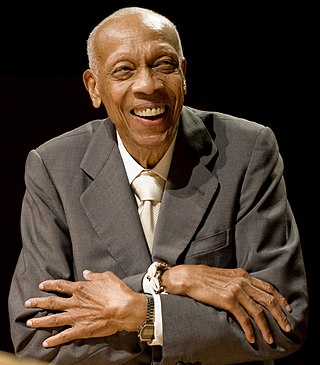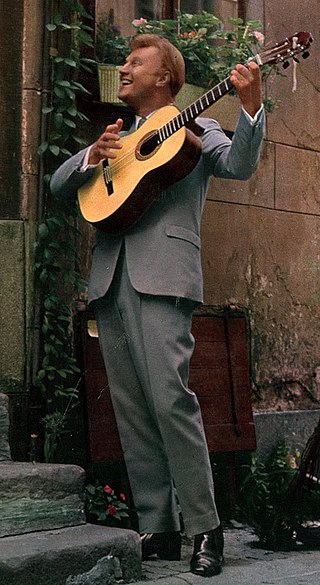Related Research Articles

Anni-Frid Synni Lyngstad, also known simply as Frida, is a Norwegian-born Swedish singer who is best known as one of the founding members and lead singers of the pop band ABBA. Courtesy titles Princess Reuss and Countess of Plauen are also in use due to her third marriage. Born in Bjørkåsen (Ballangen), Norway, to a Norwegian mother and a German father, she grew up in Torshälla, Sweden, and started her first solo career there, as a jazz singer in 1967, through a talent competition called New Faces.

Percy Faith was a Canadian–American bandleader, orchestrator, composer and conductor, known for his lush arrangements of instrumental ballads and Christmas standards. He is often credited with popularizing the "easy listening" or "mood music" format. He became a staple of American popular music in the 1950s and continued well into the 1960s. Although his professional orchestra-leading career began at the height of the swing era, he refined and rethought orchestration techniques, including use of large string sections, to soften and fill out the brass-dominated popular music of the 1940s.

Consuelo Velázquez Torres, also popularly known as Consuelito Velázquez, was a Mexican concert pianist and composer. She was the composer of famous Mexican ballads such as "Bésame mucho", "Amar y vivir", and "Cachito".

Rigoberto Tovar García, better known as Rigo Tovar, was a Mexican musician, singer and actor. Famous for his cumbias, Tovar infused traditional Mexican and Latin music with modern instruments like the electric guitar and synthesizer and popular styles such as rock and soul music.
"¿Quién será?" is a bolero-mambo song written by Mexican composers Luis Demetrio and Pablo Beltrán Ruiz. Beltrán recorded the song for the first time with his orchestra in 1953. Pedro Infante, for whom the song was written, recorded it in 1954.

Aracely Arámbula Jáquez, known professionally as Aracely Arámbula, is a Mexican actress, model, singer, television personality and entrepreneur.
"Quiéreme mucho" is a criolla-bolero composed in 1911 by Gonzalo Roig with lyrics by Ramón Gollury and Agustín Rodríguez. The song was inspired by Roig's wife, Blanca Becerra, and premiered in Havana in 1911 without much success. In 1917, it was included in the sainete El servicio militar obligatorio and performed by Becerra and Rafael Llorens to critical acclaim. Roig published and sold the rights to the song in 1921, and the first recording was made in the United States by singer Tito Schipa in 1923. The English version, "Yours", was published in 1931 in the United States. It featured lyrics in English written by Albert Gamse and Jack Sherr. Both versions have been extensively recorded and arranged by different musicians, becoming Latin music standards.

Dionisio Ramón Emilio Valdés Amaro, better known as Bebo Valdés, was a Cuban pianist, bandleader, composer and arranger. He was a central figure in the golden age of Cuban music, especially due to his big band arrangements and compositions of mambo, chachachá and batanga, a genre he created in 1952.
"Theme from A Summer Place" is a song with lyrics by Mack Discant and music by Max Steiner, written for the 1959 film A Summer Place, which starred Sandra Dee and Troy Donahue. It was recorded for the film as an instrumental by Hugo Winterhalter. Originally known as the "Molly and Johnny Theme", this lush extended cue, as orchestrated by Murray Cutter, is not the main title theme of the film, but an oft-heard secondary love theme for the characters played by Dee and Donahue. The theme has become a canonical representation of the easy listening genre, and is considered by some to be the definitive easy listening track of all time.

"Kärleken är" is a Swedish-language ballad about love. It was written by Ingela Forsman, Bobby Ljunggren and Håkan Almqvist, and sung by Swedish pop and country singer Jill Johnson in the Swedish Melodifestivalen 1998, where it won, gaining the right to compete for Sweden in the Eurovision Song Contest 1998. It finished 10th with 53 points. It was the last Swedish entry in the contest to be sung in Swedish.
"I've Told Ev'ry Little Star" is a popular song with music by Jerome Kern and lyrics by Oscar Hammerstein II, published in 1932. The song was introduced in the musical Music in the Air. The first hit recording of the song was released in 1932 by Jack Denny and His The Waldorf-Astoria Orchestra, featuring the vocals of Paul Small. It has since been recorded and sampled by many artists, including Mac Miller on the track "Knock Knock" from his 2010 mixtape K.I.D.S..

Galenskaparna och After Shave is the collaborative name of two Swedish comedy groups, Galenskaparna and After Shave, from Gothenburg. In 1982 the two groups joined in order to collaborate on the revue show Skruven är lös, and the collaboration has continued. Since the early 1980s, Galenskaparna och After Shave have produced nearly 28 revues, restaurant shows, and tours, as well as 8 movies, 5 television series and 30 studio albums.
Swedish Rhapsody No. 1 is the subtitle of Midsommarvaka, a symphonic rhapsody by the Swedish composer Hugo Alfvén (1872–1960). Although it is only the first of three similarly named works, it is often simply called "the Swedish Rhapsody".
"Que Levante La Mano" is a song written by Argentine composer Alejandro Vezzani and performed by Mexican musical group Los Ángeles de Charly for their third studio album Te Voy a Enamorar (2001) where it was released as the second single in 2002. The song is clearly an anthem for all the persons that have suffered in the love, with verses like
Spanish: Que levante la mano quien no lloro un adiós, que levante la mano quien no sufrió por amor.

Luis Alberto Jara Cantillana, or simply known as Lucho Jara, is a Chilean singer, television host and former actor. He has participated in the teleseries De cara al mañana playing as Juan José "El Turco" Aguad, and Los títeres from Canal 13, as Pato.
"Jesusita en Chihuahua" is a Mexican polka which was written by Quirino Mendoza y Cortés while he was serving as a Lt. Colonel in the Mexican Revolution and directing the military band in Puebla. Its premiere was held on Christmas Day 1916 and it has since been covered by a multitude of artists, under a variety of names. The composition became a trademark of the Mexican Revolution and was Pancho Villa's favorite musical piece to have his bands play during combat. The piece centers on soldaderas, women who accompanied the revolutionaries, tending to their needs and on occasion even taking up arms to participate in combat.

Érika Patricia Maldonado Aravena, better known as just Patricia Maldonado, is a Chilean singer and television presenter. In the 1970s to the late 1990s, she was active as a singer and political activist. Maldonado is widely known in the Chilean media for her strong personality and political controversy.

William Clauson was a Swedish-American singer of folk songs from various nations, including some of the songs of Carl Michael Bellman in both English and Swedish.

Fermín IV Caballero Elizondo is a Mexican rapper and Evangelical pastor, better known as a former part of the Mexican hip hop group Control Machete.

Knut Axel Lennart Agnred is a Swedish singer, actor, and comedian. He is known for being a member of Galenskaparna och After Shave.
References
- ↑ Paul Zyra (April 5, 2008). "Den okände "Mr Sportextra"". Sveriges Radio (in Swedish). Retrieved December 6, 2011.
- ↑ "Skruven är lös" (in Swedish). Svensk mediedatabas. 1982. Retrieved June 17, 2011.